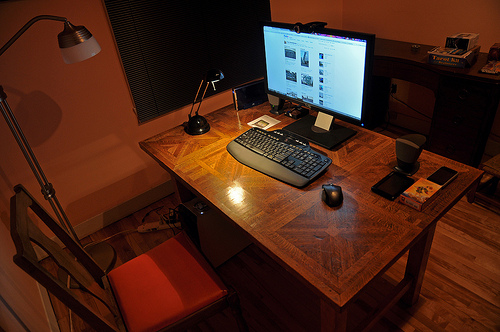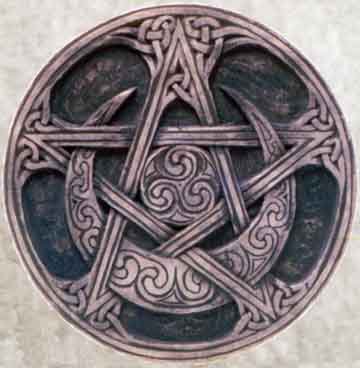I found Paganism when I was about 14 years old, poking through the odd corners of the internet. At the time, I was living in Germany and isolated from any groups with whom I could communicate. My German was, and is, terrible. While there was a small bookstore on the local Army base, with an even smaller religion section, it had only a fraction of a shelf dedicated to alternative religions. So I never would have found out much about any form of Paganism without the digital world.

[Photo Credit: Caribb/Flickr]
Once back in the states, I continued to use the internet as a source of information and still do. Amazon provided a place to order books and ritual supplies since my town didn’t have a budget new age shop. Now, rather than driving the two hours one way to attend many rituals and classes as I go through my religious training, I can simply log into SecondLife and receive instruction through that site. I also use Facebook frequently to connect with various groups across Washington state and around the country to coordinate events and schedule meetings.
For me, and many of my peers, the internet has made Paganism much more accessible. Young seekers don’t necessarily have cars to drive to events or stores. We don’t have a place of our own, or the ability to squirrel away books and ritual gear from nosy guardians or overly-curious roommates. With the internet, we can fit the learning into our work or school schedule, and most importantly, it is all contained in one “box,” which can be shut down as needed.

WWU Pagan Logo
It seems ironic that a religion focusing on a renewed connection to the earth and nature should benefit so strongly from the addition of the internet, but that’s where some of us are. Simone Mack, a 22 year old Hedge Witch and the current Public Liaison/Vice President of the campus group WWU Pagans, explained how the internet has helped her research different philosophies and paths, which she incorporates into her own form of eclectic Paganism. Mack added that when she started searching almost eight years ago, she had a hard time finding information that wasn’t Wiccan-centric. “I didn’t realize that there were paths other than Wicca … It may have been because I was using the wrong search terms, but whatever it was, I wasn’t able to find the information.”
Much has changed in the last eight years. Information about a multitude of paths is more readily available. Mack said that she use to find a lot of her information through e-commerce sites that also had informational pages. Now she’s finding more of her sources through sites that are exclusively dedicated to distributing information or offering a space to build community.
However, this increase in digital information isn’t always a good thing.”You see a lot of misinformation and appropriation,” Mack said of the drawbacks of the internet. A recent example of this misinformation was when a satire site posted a story about Pope Francis declaring that “All religions are true.” Quotes from that article are still circling the internet, attributing the quote to Pope Francis even though he never said it. Being new to the Paganism, or any religious community, Millennials might not know which sites are legitimate and which aren’t; which information is solid and which isn’t.
While Millennials do recognize these dangers, many of which go far beyond just misinformation, we don’t spend our time worrying about it. We know there’s a risk, just like walking down the road or crossing a busy street. Being able to communicate with other people and having access to a massive amount of information seems to outweigh any risks. According to Pew Forum data, 74% of American Millennials believe that technology “makes life easier;” which is higher than any other single generation and higher than the overall average of 64%.
Aside from individual risks, research data may also be proving that increased internet usage is a big negative for more traditional organized religions. Allan B. Downey, a professor of computer science at the Olin College of Engineering, found in his study entitled “Religious affiliation, education and Internet use” that there is a minor correlation between internet usage and the rise in people identifying as “unaffiliated.”
While correlation does not imply causation by any stretch, it is an interesting detail to note. Could the internet be one of the major driving forces behind the decrease in people identifying with organized religion? Is it contributing to the noticeable growth of Paganism by making minority practices more accessible to Millennials and even younger generations?
 In the article “Nones on the Rise,” Pew Research offers a few theories on why there is a decrease in self-identification with organized religion. With the availability of information, people are more free to learn about what’s out there. It’s no longer as simple as your parents or immediate community guiding you and pestering you to believe what they believe. You can learn about other things, ways of living, and find a community of like-minded people.
In the article “Nones on the Rise,” Pew Research offers a few theories on why there is a decrease in self-identification with organized religion. With the availability of information, people are more free to learn about what’s out there. It’s no longer as simple as your parents or immediate community guiding you and pestering you to believe what they believe. You can learn about other things, ways of living, and find a community of like-minded people.
Unfortunately Downey didn’t break his religious research down by age or generation. However, in the Pew Forum study “Religion Among Millennials,” it was noted that this younger generation is less likely to be religiously affiliated than their older counterparts. According to the research, 26 percent of Millennials did not associate with a specific religion as opposed to 20 percent of Generation X at the same age and 13 percent of Boomers at the same age. Comparing this to a different Pew study, 93 percent of Millennials are regularly using the internet. That percentage drops considerably with age. The correlation between religious affiliation and internet use may be minor but it is notable.
The internet, in a sense, is serving as one giant interconnected community. There are good people and bad people; good information and bad information. It’s not much different than any small-town community, just much larger and far more diverse than any physical community could be. As a result, it has become easier for Millennials to find and learn about all sorts of different types of alternative religious paths from Wicca to Asatru and beyond.
“I feel like the online community aspect is really amazing, especially for those who don’t have a physical community available to them,” Mack said. The Pew Forum research supports her statement. It notes that 54% of Millennials believe that the internet brings people closer together. Again, that number is higher than any other generation or the average.
Even when there’s a physical community available, the internet can make things easier. We can plan out events, see who’s coming, coordinate potluck offerings. It was nice that our local Yule event had more substantial offerings than cookies and booze. Today, I am part of no fewer than a half dozen different Pagan groups that are all active weekly. This past Yule I received approximately the same number of Yule invites to different celebrations across the country – all politely declined in favor of the one I was hosting.
For myself and many other Millennials, the internet has brought me closer to people and helped strengthen my religious practice. I can be in Germany, some six thousand miles away, or holed up at 3 a.m. in my bedroom in Washington and my community is still no more than a click away.
The Wild Hunt is not responsible for links to external content.
To join a conversation on this post:
Visit our The Wild Hunt subreddit! Point your favorite browser to https://www.reddit.com/r/The_Wild_Hunt_News/, then click “JOIN”. Make sure to click the bell, too, to be notified of new articles posted to our subreddit.
This is not a wet blanket, just an observation: Little here is uniquely Pagan. The digital age has facilitated the spread of Paganism as it has all sorts of social innovations, because it moves bulk information quickly and efficiently. It may have a hand in eroding traditional religious affiliation just as it undermines local social narrowness on a broad front.There’s a hint of an answer to this question in your hosting a Yule celebration, but I must ask if you ever get out into the environment and connect with the physical land. That’s an important part of my Paganism and I find it hard to get my head around one of which it is not, but that may be merely my own failure of imagination.In any event, thank you for your perspective.
I also found that when I first got an internet capable PC back at the turn of the millennium it was a revelation to be able to search for information and other people/groups.
The digital world really needs to be kept in context though i think; it could be allowed to take over all aspects of life and become the be all and end all. Living in a digital world isnt really living; the digital world should really only be a doorway to open up the real world..but the real world needs to be where we operate.
“Moderation in all things”
— Terence
I remember when I was a teen in High-school. I had strong Literature so we studied the Grimm fairy tales (among others) and in order to complete a paper I had to look for symbols… So one day I went down to the village library (my favorite place there) and, instead of heading towards the comic book section as I usual did, I went straight to the Philosophy/Religion/Esoteric shelf and left with The Dictionary of Symbols. A couple days later, when looking further down the shelf I noticed a series of book with odd sigils and strange names such as Dragon Rouge…A couple weeks later, I teamed with a class buddy for a semester-long free research project. His parents were very nice and somewhat New-Agy so we decided to write an essay called “Comparative Cosmology”: It was the first time that I looked really closely to old myths and Religions of the world as well as theorists like Eliade and Jung. Contrary to Mary, my English was then non-existent so I got most of my info from actual books. It was also the first time I started thinking about the christian religion as a whole and realized that it was definitely not for me (not that I identified with it before but anyway). Still, it twas only many years later that I managed to actually get good enough in English (+ meet a few people) to be actually able to get decent information from the internet. Interestingly enough, I took a completely different path than Mary but I guess it does not really mater as long as one finds himself.
Mary, did WWU Pagans get permission from Paul Borda, whose design that is?
http://www.dryaddesign.com/index.php/prod_detail/moon_pentacle/
I keep getting the idea that “minority” or “bookless” religions are being classified as Nones, when we are nothing of the sort. Anyone else have that feeling?
The category “none” arises from the survey question, “to what religious institution are you affiliated?” or something like that. They certainly ought to have an “other” category if they offer answer choices. But solitaries might get swept up in the classification. IIRC it originates from Pew surveys. You might google them.